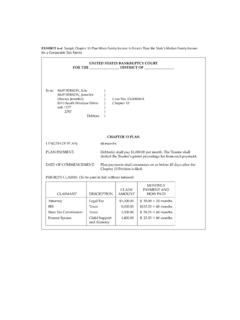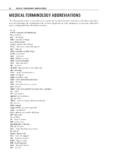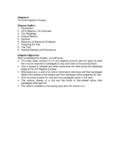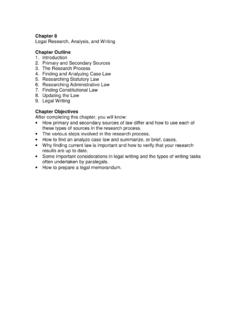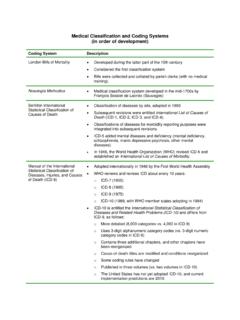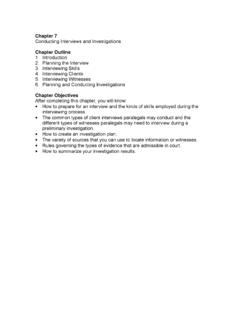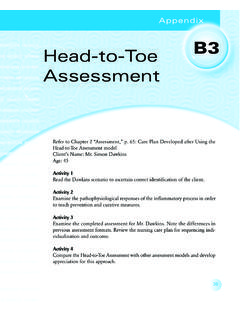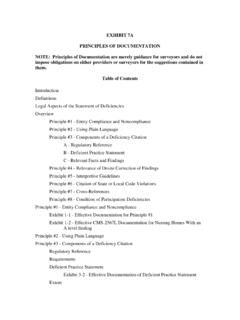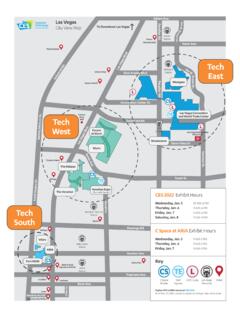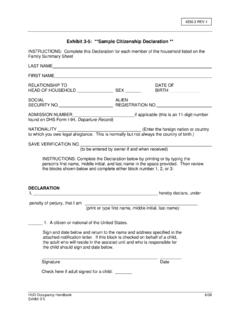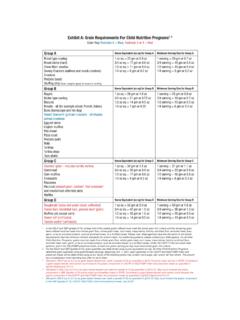Transcription of EXHIBIT 4:1 Sample Complaint (State)
1 EXHIBIT 4:1 Sample Complaint (State). STATE OF COLUMBIA CAPITOL COUNTY CIRCUIT COURT. (caption) MARY E. JOHNSON, Plaintiff v. Civil Action, File No. 00000. ARTHUR HENDRICKS, Defendant JURY TRIAL DEMANDED. Complaint FOR NEGLIGENCE. The Plaintiff states that: (body) 1. The court has jurisdiction in this matter under Section 403A, Title 23 of the Columbia Revised Statutes. 2. Plaintiff is a paralegal and resides at 43 South Senate Avenue, Legalville, in Capitol County, Columbia. 3. Defendant is a baker and lives at 500 Maple Street, Legalville, in Capitol County, Columbia. 4. Defendant owns and operates the Deli Bakery at 508 Maple Street, Legalville, in Capitol County, Columbia. 5. On August 23, ____, at said bakery, Defendant sold Plaintiff a chocolate eclair, which was negligently prepared containing pieces of glass. 6. Plaintiff ate said pastry, receiving the following damage: a. Great pain and suffering b. Internal injuries c.
2 Medical and hospital bills d. Loss of income (prayer for relief) WHEREFORE, Plaintiff demands judgment in the amount of ten thousand dollars ($10,000), together with the costs and disbursements of this action. Plaintiff demands trial by jury. _____. Plaintiff's Attorney 407 E. Second Avenue Legalville, Columbia State of Columbia County of Capitol (verification) Mary Johnson, on oath, deposes and states that she has read the foregoing Complaint and that the matters stated therein are true to the best of her knowledge, information, and belief. _____. Mary Johnson Subscribed and sworn to before me this 12th day of October, ____. _____. Notary Public My commmission expires: _____. 2008 Thomson Delmar Learning EXHIBIT 4:2 Causes of Action and Remedies3. Breach of Contract In any type of contract action, the existence of the contract and the type of contract must be proven. The law recognizes three types of contracts. 1. Oral contracts In the Complaint , the plaintiff must allege the terms of the contract including the consideration for the contract.
3 2. Written contracts The plaintiff must allege the terms of the contract or attach a copy of the contract to the Complaint as an EXHIBIT . 3. Implied contracts An implied contract may exist when, despite no formal agreement, the actions of the parties cause the court to find that a contract exists. For example, a person operating a restaurant may be found by the court to have an implied contract to provide the public with healthy, wholesome food. If the patrons in the establishment are suddenly struck with hepatitis, a suit for breach of this implied contract may result. In a suit of breach of implied contract, the following facts must be alleged in the Complaint : The performance by the plaintiff of the contract terms or the excuse for his [or her] nonperformance;. The facts which caused the defendant to fail to fulfill his [or her] part of the contract; and The damages suffered by the plaintiff as the result of the defendant's nonperformance.
4 Remedies available General damages: Compensation for the injuries suffered by the plaintiff directly stemming from the defendant's breach. Special damages: Compensation for the out-of-pocket expenses suffered by the plaintiff due to the breach, such as loss of earnings, medical expenses, and injury to property. Attorney's fees: Attorney's fees are available in any contractual action if called for under the terms of the contract. Costs of suit: Costs of suit are available in any action at the discretion of the court. Liquidated damages: Some contracts include in their terms a liquidated damages provision, spelling out specific sums payable by a party upon breach of the contract. These provisions may have an effect on the damages awarded to the plaintiff. 2008 Thomson Delmar Learning EXHIBIT 4:2 Causes of Action and Remedies3 (continued ). Exemplary damages: Recently, some state courts have recognized and approved the award of exem- plary or punitive damages in a breach of contract case, if the breach is found by the court to have been willful or malicious.
5 Exemplary damages are awarded by the court to punish the defendant because of the particularly reprehensible nature of his actions. Prejudgment interest: Some contracts have provisions for the payment of interest by the defendant on any sums which are to be found due and owing to the plaintiff. Anticipatory Breach of Contract If one party to a contract unilaterally repudiates the contract before the time of performance, the injured party may either: Wait until the time for performance of the contract, and bring suit for breach of contract; or Bring immediate suit for anticipatory breach of contract. The defendant's repudiation of the contract may take one of two forms: (1) Expressed, when defendant's repudiation is clear, positive, and unequivocal; or (2) Implied, when the actions of the defendant make per- formance of the contract impossible. An example of this cause of action would be a farmer who contracts with a laborer to plow [a] field on a given date.
6 Prior to the date of the plowing, the laborer communicates to the farmer [a refusal to] plow the field (expressed anticipatory breach), or the farmer learns that the laborer will be out-of-town on the date set for the plowing (implied anticipatory breach). In either of the [these] instances, the farmer will have a cause of action for anticipatory breach of contract. In bringing suit for anticipatory breach of contract, all the following elements must be pled: Existence of a contract;. The actions of the defendants which caused the anticipatory breach;. That these actions happened before the time of performance of the contract;. That the plaintiff has performed his duties under the contract; and That plaintiff has been injured by the actions of the defendant. Remedies available The following remedies are available in an action for anticipatory breach of contract: Compensatory damages: The measure of the compensatory damages is the amount that will fully compensate the plaintiff for the damages caused by the breach, or that will result from the breach in the ordinary course of events.
7 Future damages: The plaintiff is entitled to any damages that he may foresee as the result of the breach, but only at their present value. Limitation on damages: The damages awarded for anticipatory relief are limited to reasonable dam- ages. No punitive or exemplary damages may be awarded, nor can the plaintiff receive a greater amount than he [or she] would if the contract had been performed. Specific Performance The remedy for a cause of action for specific performance is a court order that the contract in question be per- formed exactly as it was written and negotiated. This remedy is not available for the following types of contracts: Personal service contracts;. Contracts to employ another;. Contracts for acts which the party charged with performing the act has no legal power to do at the time of the contract. An example of this bar would be a contract to sell a piece of property before the selling party had in fact purchased it; and Agreements to obtain the consent of a third party.
8 (continued ). 2008 Thomson Delmar Learning EXHIBIT 4:2 Causes of Action and Remedies3 (continued ). The elements making up the specific performance cause of action are: Existence of the contract;. As well as containing the elements listed in [Breach of Contract], the Complaint must also state that performance of the contract was possible for both parties. That the plaintiff has performed his [or her] duties under the contract;. That the defendant has failed to perform his [or her] duties under the contract; and That the plaintiff has an inadequate remedy at law. This means that an award of money will not com- pensate the plaintiff for the damages suffered. It is this element that separates a cause of action for specific performance from a cause of action for breach of contract. Remedies available The following remedies are available in an action for specific performance: In general: An order for performance of the contract; and An adjustment for the losses suffered by the parties because of the delay in performance.
9 In actions involving real property: Rents and profits which would have accrued to the plaintiff had he obtained the property under the contract;. The buyer of real property may be awarded interest on any money deposited in escrow;. The seller of real property may be awarded interest on any money he would have received had the property been bought; and The seller may recover the upkeep expenses of the property, such as taxes and insurance costs. Injunctive relief. Injunctive relief is an order by the court that an action be done or to prevent someone from performing a specified action. Contractual Reformation Contractual reformation is a request to the court to change the terms of a contract because of an error made by the parties. The elements to prove this cause of action are: Existence of the contract;. The mistake which arose between the parties; and The grounds for the reformation which include: Mutual mistake of fact; or Fraud, which occurs when one party falsely represents that modifications will be made to the written agreement conforming with the original agreement between the parties.
10 Remedies available The sole remedy for a cause of action for contractual reformation is correction of the error made in the contract. Rescission This action calls upon the court to cancel a contract on any of the following grounds: The agreement was made under a mistake of fact or law;. That the party requesting the rescission was mentally incompetent;. 2008 Thomson Delmar Learning EXHIBIT 4:2 Causes of Action and Remedies3 (continued ). That there was a material breach of the contract;. That all parties to the contract agreed to the rescission;. That the agreement was induced by fraud, duress, menace, or undue influence; or That the contract was unlawful or against the public interest. The elements which must be pled in the Complaint are: Existence of a contract;. The grounds for the rescission as listed; and That the plaintiff suffered a material injury. Remedies available The following remedies are available in an action for rescission: Implied damages: This remedy includes the repayment of any contractual consideration provided by the plaintiff and all incidental damages that may have been suffered as the result of the contract.
